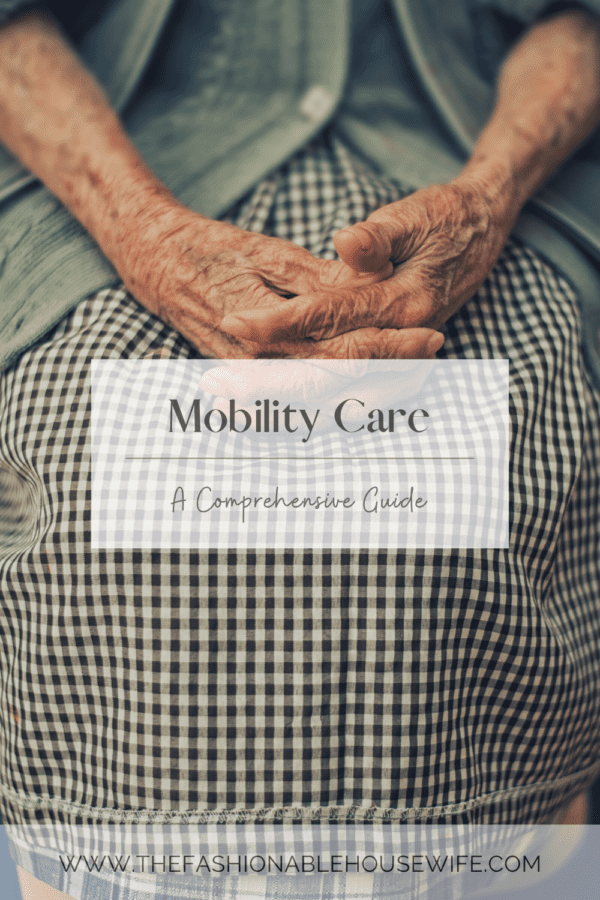
Taking care of patients with mobility problems comes with its own set of difficulties. An injury, a progressive disease such as muscular dystrophy or Parkinson’s disease, an amputation, or the kind of constrained maneuverability that comes with old age can all contribute to mobility issues. Mobility concerns, like any other condition, should be treated and dealt with as part of personalized care, which involves addressing a patient’s impairments and abilities on an individual level.
For Whom Is Mobility Care Intended?
Mobility Care is for people with limited mobility and may require assistance in performing daily tasks independently. Maybe you’re just confined to a wheelchair or bed due to a fall or ailment, or you have a neurological or joint condition? Whatever your situation, some institutions can assist you in regaining as much movement as possible while staying in your residence.
At-Home Care for a Family Member with Constrained Manoeuvrability
As we progress through life, mobility problems become more prevalent, and many folks find that their movement is harmed as they get older. Sadly, as we get older, we often seem to become less energetic, occasionally citing concerns of falling, which can create a “brutal circle” impact on our overall movement.
It’s natural to want to do stuff for our loved ones as they become less agile, rather than inspiring them to work on improving their range of motion in minor ways; this is comprehensible when you care about someone, but trying to encourage them to take a few steps or to do so in small ways is essential.
Reduced mobility can also be caused by muscle vulnerability, anguish, or joint issues, and it’s entirely plausible that somebody who suffers from these conditions would be hesitant to move, particularly if they’ve become accustomed to their current situation. In an ideal world, we’d all be as active as possible before we get older, as this would help avoid some of the factors that contribute to reduced mobility later down the line.
As we grow older, we lead a progressively sedentary life, which can have negative consequences. Attempting to accomplish some activity level a day can assist us in becoming less hesitant to be involved. Your caregiver will be a massive supporter of helping you remain as active as conceivable while inspiring your autonomy.
What Are the Advantages of Mobility Assistance?
Having a caregiver assist you with your mobility in the comfort of your own home can make a huge difference in your day-to-day life. This is because they will invariably try to make you as self-sufficient as plausible rather than doing it all for you.
This implies you have as much control over your care as you would like while always remaining in the driver’s seat. There’ll always be times when you are more able to be engaged than others, and having your caregiver with you whenever you are less capable of managing ensures that you are well cared for on those days when you may want to stay in bed or use your mobility aid like the pathrider 140xl.
On a sunny day, you can opt to go outside your home and meet the community. Another option is to stay close to your home. Plow some weeds off your garden or even plant some seedlings with the help of your carer, of course.
Most caregivers are also well-versed in the technical aspects of your mobility care, such as hoisting, wheelchairs, and other assistive devices. This means that even if you can’t get out of bed without help, you can still be mobilized and enjoy everything your residence and community have to offer.
What Can Mobility Care Do for You?
Mobility care can profit your mental well-being as well as your physical health. Close relatives may not be capable or willing to assist you if you are incapable of getting out of bed without assistance, for example, due to the dangers to your and their health posed by inaccurately moving someone.
Your specially qualified caregiver, on the other hand, will be able to completely endorse you with the appropriate methods and equipment, keeping both you and them safe throughout the maneuver.
As a result, you can get out of your bed or chair and take advantage of everything your home has to offer, whether it’s cooking, gardening, or walking to the front gate.
This increased independence will gradually improve your emotional stability because you will have a more active daily life and also significantly improve your movement and the long-term benefits that this will provide.
Takeaway
When you work with a reputable company, you can rest assured that the caregiver who looks after you or a loved one is well-trained to provide the assistance you require while maintaining the high standards you deserve. Every caregiver goes through an orientation program that exceeds the minimum requirements.
If a person has a mobility problem, needs mobility help after a stroke, or needs mobility aid due to general fragility, all caregivers will ensure they have all the care and guidance they require to deliver efficient care.



